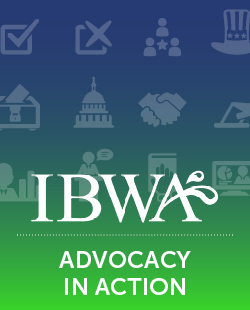Issue Statement – Groundwater Resource Management
Issue Statement – Groundwater Resource Management
IBWA STATE AFFAIRS
ISSUE STATEMENT
1/20/00
ISSUE: GROUNDWATER RESOURCE MANAGEMENT
POSITION: Water is a renewable resource. Bottlers have a vested business interest in protecting both the quality and quantity of this renewable resource. Our industry’s future depends on good stewardship of water resources.
IBWA is opposed to legislation and regulation that would restrain the private use of a groundwater resource through financial means or other imposition. IBWA must ensure that groundwater management laws and regulations are equitable, that groundwater use for bottled water is not unfairly singled out, and that groundwater use for bottled water is not assigned a low priority in any groundwater management plan.
BACKGROUND: Many states have historically believed ownership of groundwater was tied to ownership of the land above it. Increasingly, some states now view groundwater as belonging to the public rather than individual landowners.
There has been a flurry of legislative and regulatory activity at the state and local level aimed at restraining private use of a groundwater resource through financial means or other impositions. While the largest bottlers have been the most visible targets, industry critics?including environmentalists, public officials and local landowners?have cast a net over the entire industry. Since 1998, the following state and local actions targeted bottled water:
-In August 2000, the County Commission of Fannin County, Georgia, held a public hearing regarding water use by bottled water companies. The hearing was the culmination of a “campaign” by a self-appointed watchdog who distributed literature throughout the county and wrote editorial letters claiming, among other things, that county residents “can be assured that their water supply will soon be depleted” by bottled water companies. After hearing testimony on the hydrogeology of springs and wells by a university professor, the commission declined to take any action.
-At the request of the New Hampshire Department of Environmental Services, legislation was introduced in New Hampshire that sought to impose a $0.02 per gallon tax on water withdrawals by commercial bottled water operations. The January 2000 legislation was later amended to assess a 2 cents per bottle fee on bottled water at the point of distribution. After testimony was presented by IBWA and other opponents, the bill was later sent to a study committee.
-In Pennsylvania, the Pennsylvania Bottled Water Association (PaBWA) successfully amended a bill in 2000 which retains the state’s and river basin commissions’ control over regulation of water withdrawal and not with local government. Also, PaBWA persuaded the state Legislature to amend another bill on land use law whereby the state must consider local laws, but does not require that state agency decisions be consistent with such plans.
-In 1999, three separate bills were pre-filed in the New Hampshire Legislature that would prohibit transport of bulk water out-of-state, assess a fee on groundwater withdrawals and impose a fee on water sold at retail. The bills did not pass out of committee.
-In 1998, the New Hampshire Legislature instructed the state Department of Environmental Services (DES) to promulgate rules pertaining to identification and mitigation of impact from new groundwater withdrawals of 57,600 gallons or more per day. DES proposed rules that would place a 10-day moratorium on all groundwater withdrawals during drought conditions on sources within 250 feet of a designated river or stream. Also during that year, the state House of Representatives considered and later tabled a measure suspending state preemption of local groundwater ordinances and regulations. The lawmakers’ concern was groundwater use for bottled water purposes.
-In 1998, legislation in Pennsylvania sought authorization for municipalities to establish an “integrated water resource plan.” Under the bill, regulation of water withdrawal and use would be based on, among other things, location; proximity to and impact on existing supplies and sources; impact on the base-flow of streams in the watershed; zoning district and nature of the use. The bill’s sponsor publicly stated that the impetus for the measure was concern over groundwater withdrawals for bottled water use. After a single hearing, the legislature declined to consider the measure.
TALKING POINTS
-The total amount of groundwater used by the bottled water industry is statistically insignificant. The United States Geological Survey (USGS) calculated that of the 79.4 billion gallons of daily groundwater withdrawal in the U.S., only .0003% is consumed by the bottled water industry. Many other industries such as electrical power and agriculture use far more water.
-Water is a renewable resource. Bottlers have a vested business interest in protecting both the quality and quantity of this renewable resource. Our industry’s future depends on good stewardship of water resources. Decisions on siting water sources are guided by the use of sound science and appropriate regulatory oversight.
-Water bottled for drinking is consumed 100 percent of the time for human hydration. It is also a highly efficient use when contrasted with the fact that less than 2 percent of water withdrawn by public utilities is actually used for drinking and cooking. The other 98 percent of tap water is used for toilets, laundry, car washing, etc.
-State and/or local regulatory agencies approve water sources.
-Before developing a spring source, a bottled water company conducts a comprehensive analysis to assure the collection of spring water will not adversely impact the spring, nearby water supplies or the health and vigor of related aquatic systems. This program includes, depending on the specific conditions of the area, test wells, sampling and pump tests. An on-going monitoring program provides data about the conditions of the aquifer and surrounding area which may include water levels, climate changes, and stream flow.
-The industry takes pride in the strong record we have earned for responsibly managing spring sites. Environmental stewardship is not only the right thing to do for nature and our neighbors, it is also in our best long-term interests to do business in a conscientious manner. Indeed, protecting groundwater resources is a part of our mission:
Our commitment, as a member of IBWA, is to provide our consumers with high quality bottled water. To assure them a safe and plentiful water supply, we are dedicated to responsibly managing our renewable resources using sound science and environmental stewardship, with no adverse impact on the source, the surrounding environment, or our neighbors.


